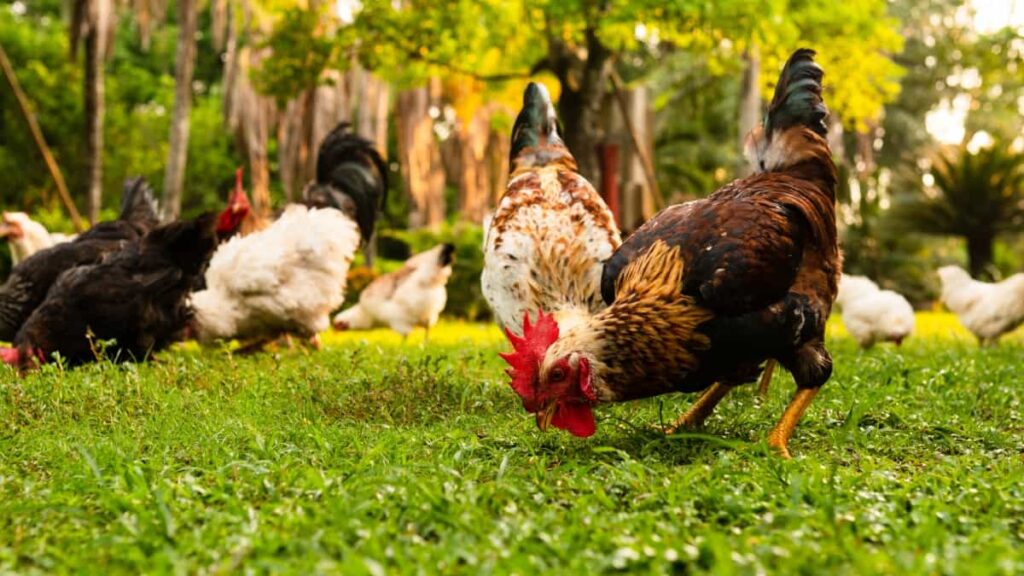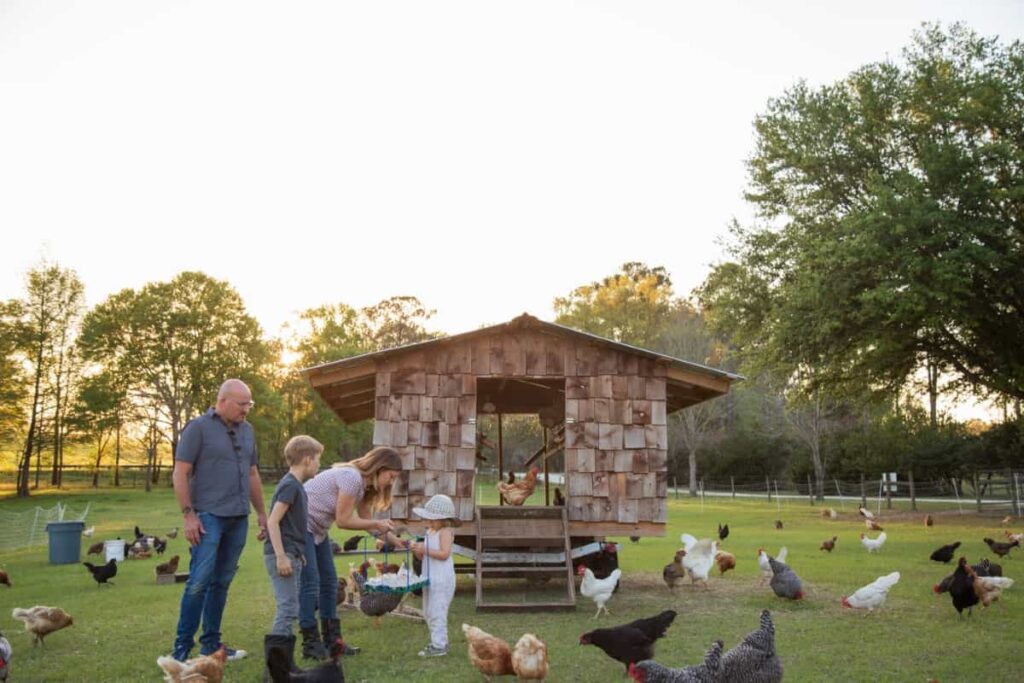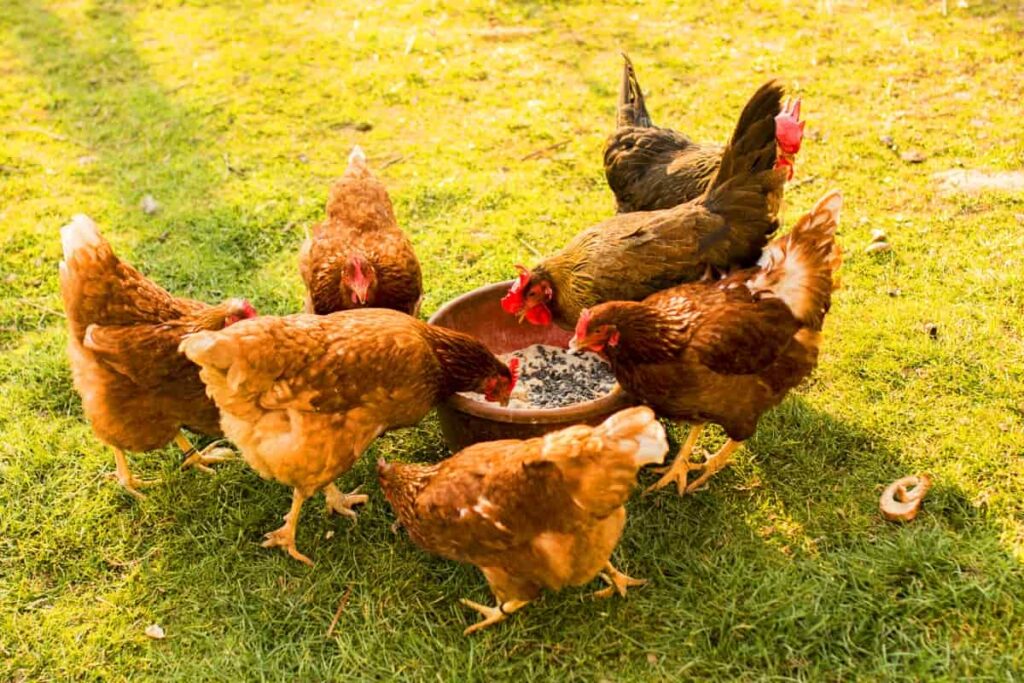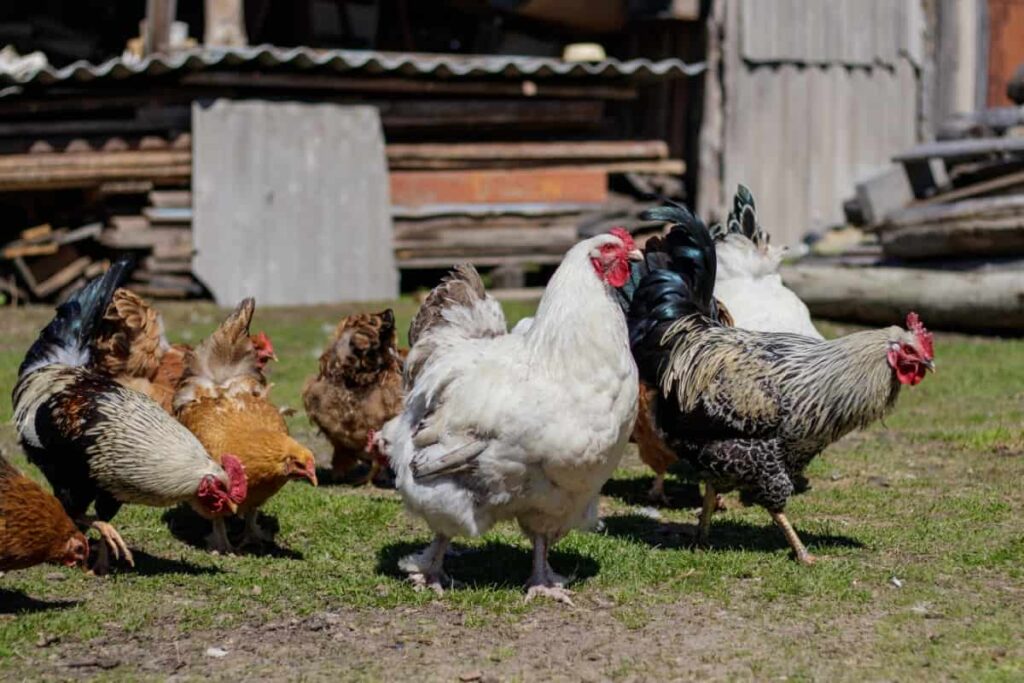Backyard poultry farming in the Philippines is a popular and thriving practice among many Filipinos. By raising chickens in your backyard, you have full control over their diet and living conditions, ensuring that they are free from harmful chemicals or antibiotics. Backyard poultry farming is important because it provides a sustainable source of fresh and nutritious protein for Filipino households.

Backyard Poultry Farming in the Philippines
Benefits of Backyard Poultry Farming in the Philippines
Philippines backyard chicken farming promotes self-sufficiency and food security. Filipinos can produce their food instead of relying heavily on imported products. This not only reduces dependency on external sources but also contributes to the local economy by supporting small-scale farmers.
Furthermore, backyard poultry farming serves as an excellent educational opportunity for children and adults alike. Raising backyard chickens can be a profitable venture for individuals looking to make some extra income. The surplus eggs or meat can be sold locally or even through online platforms like social media groups or e-commerce websites.
Chicken Breeds to Raise in Backyards of Philippines
The popular breed for backyard poultry farming in the Philippines is the Rhode Island Red. These chickens are known for their hardiness and ability to adapt to various climates. They are also excellent egg layers, making them a practical choice for those looking to produce eggs. Another great breed option is the Plymouth Rock or Barred Rock. These chickens have a calm temperament and can tolerate both heat and cold weather conditions.
If you’re interested in raising chickens primarily for meat production, consider breeds like the Cornish Cross or Sussex. Other poultry breeds for backyards in the Philippines are Rhode Island Red or Plymouth Rock, Banaba Chicken, or Darag Native Chicken due to their adaptability and high egg-laying capacity. Raising free-range chickens in the Philippines plays a major role in pest control by eating insects harmful to crops. Furthermore, this method of chicken farming is environmentally friendly.
Choosing the Right Breeds for Backyard Poultry Farming
The important factor to consider when choosing chicken breeds is their temperament. Some breeds are known for being friendly, while others may be more flighty or aggressive. Another consideration is egg production. The climate plays a main role in breed selection. The Philippines has a tropical climate with humid conditions year-round. Additionally, some chicken breeds are better suited for free-range environments than others.
In case you missed it: Cassava as Livestock and Poultry Feed: Exploring Benefits with Different Animals

Housing and Shelter for Backyard Poultry Farming
There are various options available depending on the size of your flock. You can choose between traditional chicken coops or more modern designs like portable chicken tractors. The important thing is to ensure that the housing provides enough space for the chickens to move around freely.
The shelter should also protect them from harsh weather conditions like extreme heat or heavy rains. Proper ventilation is vital to prevent respiratory issues, while insulation helps regulate temperature during colder months. Maintaining cleanliness inside the coop is crucial for preventing diseases and parasites from spreading among your flock.
Feeding and Nutrition for Backyard Poultry
A well-rounded diet for backyard poultry typically includes a combination of grains, protein sources, minerals, vitamins, and fresh water. Grains like corn and rice provide energy to fuel their daily activities. Meanwhile, protein sources such as soybean meal or fish meal help with muscle development and egg production.
Offering a variety of greens like grasses or kitchen scraps can also supplement their diet with essential nutrients. Regularly monitoring your flock’s body condition and weight can indicate if they’re receiving adequate nutrition. Remember that providing clean water at all times is as important as good-quality feed. Chickens need daily access to fresh water for digestion and overall hydration.
Disease Management in Backyard Poultry Farming
Disease management is an essential aspect of backyard poultry farming in the Philippines. Just like humans, chickens are susceptible to various diseases that can impact their health and overall productivity. As a responsible poultry farmer, it is crucial to implement effective disease prevention and control measures. The key practice in disease management is maintaining good biosecurity on your farm. Regularly disinfecting equipment and providing clean bedding can also help prevent the spread of diseases.
Another important aspect of disease management is vaccination. Vaccinating your chickens against common diseases can greatly protect the overall health of your flock. Monitoring for signs of illness is vital in early detection and treatment of diseases. Proper nutrition plays a main role in disease prevention as well. In addition to these preventive measures, it’s crucial to know about common poultry diseases prevalent in the Philippines so that you can take appropriate action if needed.
Egg Production in Backyard Poultry
Backyard poultry farming allows you to have a steady supply of nutritious and organic eggs right at your fingertips. Whether you prefer white-shelled eggs or brown-shelled ones, various chicken breeds can suit your preferences and produce high-quality eggs. When it comes to backyard egg production in the Philippines, some chicken breeds excel more than others. For instance, the Rhode Island Red is known for its consistent laying ability, producing large brown eggs throughout the year.
Another popular breed for egg production is the Leghorn, which lays large quantities of white-shelled eggs. If you’re looking for a dual-purpose breed that provides both meat and ample egg production, consider raising Australorps or Sussex chickens. It’s essential to provide proper nutrition and care for your flock to ensure optimal egg production.
Cost of Backyard Poultry Farming in the Philippines
Cost is an important factor to consider when starting a backyard poultry farming venture in the Philippines. The initial investment will include purchasing the chickens, building or renovating a coop, and buying necessary equipment such as feeders and waterers. On average, the cost to start a small-scale backyard poultry farm can cost around PHP 5,000-10,000
Marketing and Selling Backyard Poultry Products
It is an important aspect of running a successful backyard poultry farm in the Philippines. Once you have raised your chickens and have a steady supply of eggs or meat, it’s time to start thinking about how to market and sell your products. The effective way to market your backyard poultry products is through word-of-mouth. Spread the word among family, friends, and co-workers about the high-quality eggs or meat you are producing.
In case you missed it: Integrating Technology in Poultry Farming Operations: For Healthy and Profitable Poultry Business

Another marketing strategy is setting up a small roadside stand or participating in local farmers’ markets. Online platforms also offer great opportunities for marketing backyard poultry products. When it comes to selling backyard poultry products, always prioritize product quality and customer satisfaction above all else. Make sure packaging is attractive yet practical for transportation while maintaining product freshness.
Government Regulations for Backyard Poultry Farming in the Philippines
The important regulation is obtaining a permit or license from the Department of Agriculture (DA) before starting your backyard poultry farm. This helps maintain control over disease outbreaks and ensures that proper standards are being met. Additionally, backyard poultry farmers must adhere to guidelines regarding chicken housing and sanitation. Furthermore, regular inspections by agricultural officers may be conducted to verify compliance with regulations. These inspections help to find any potential risks or issues that need immediate attention.
Another key aspect of government regulations is ensuring biosecurity measures are implemented on farms. This includes limiting access to outsiders who could introduce diseases or contaminants into the flock. Backyard poultry farmers in the Philippines need to keep accurate records of their operations. This includes vaccination schedules, feed purchases, mortality rates, and sales records. Keeping detailed records not only assists with traceability but also demonstrates compliance with regulatory standards.
Frequently Asked Questions (FAQ) on Backyard Poultry Farming in the Philippines
How Often Do I Need to Clean the Coop?
Regular cleaning is necessary to maintain good hygiene for your chickens’ health. The frequency will depend on the number of birds you have, but aim for weekly cleanings.
Do I Need a Permit to Start a Backyard Poultry Farm in the Philippines?
Regulations regarding permits may vary depending on your location within the country. It’s advisable to check with your local government unit (LGU) or Department of Agriculture (DA) office regarding any required permits or regulations for backyard poultry farming.
What Diseases Should I Watch Out for When Raising Backyard Poultry?
Common diseases affecting backyard poultry include Newcastle disease, avian influenza (bird flu), infectious bronchitis, coccidiosis, and parasitic infections such as worms or mites.
In case you missed it: Sustainable Poultry Farming: Benefits and How to Reduce Your Carbon Footprint with Chickens

Conclusion
Backyard poultry farming in the Philippines offers numerous benefits for individuals and communities alike. It promotes self-sustainability as it reduces reliance on commercial farms for poultry products. This not only saves money but also provides a sense of fulfillment, knowing that you can produce your food. Moreover, backyard poultry farming contributes to a more sustainable environment.
- Profitable Village Farming Business Ideas in 2024
- High-Yield Aquaculture: Fast-Growing Fish for Farming
- Effective Fish Pond Construction Techniques for Beginners
- Irrigation and Water Management in Pineapple Farming
- Blossom to Harvest: Mastering Flowering and Pollination in Papaya Farming
- Pig Fattening Essentials: From Selection to Sale for Beginners
- Raising Wagyu Cattle: A Complete Guide for Premium Beef Production
- Soil Types and Their Water Holding Capacity
- Optimizing Irrigation Schedules for Coconut Groves for Enhanced Yield
